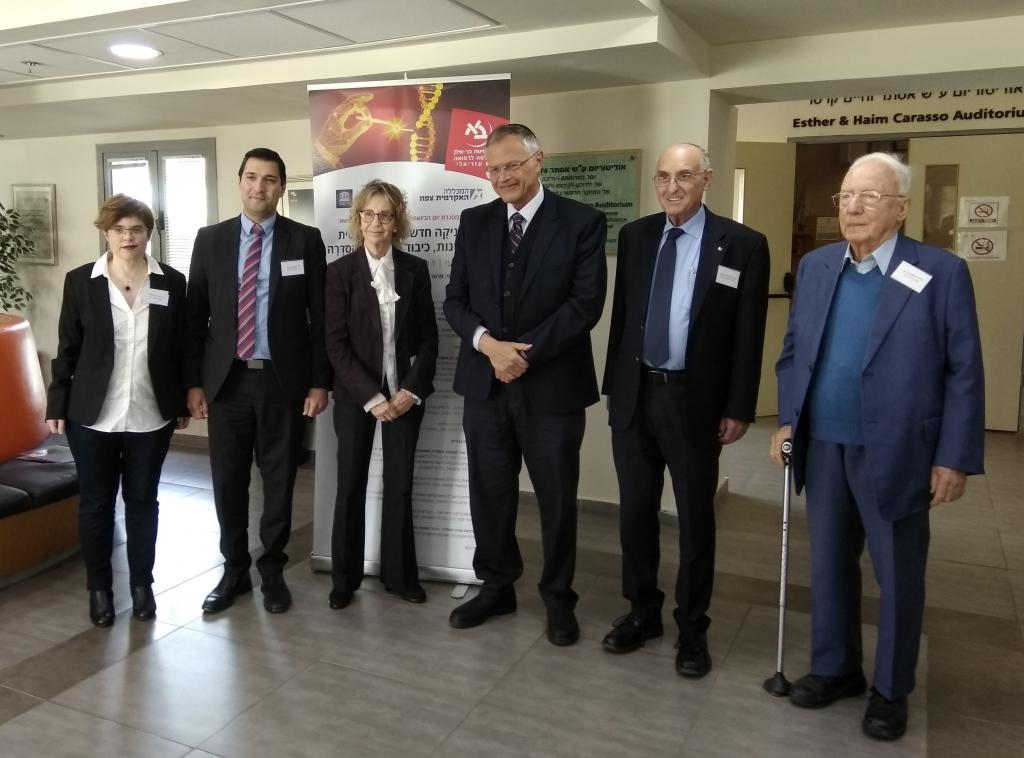Will Our Children Be Able to Sue the Doctors Who Brought Them Into This World? Azrieli Faculty of Medicine Hosts Eugenics and Genetic Editing Conference, December 5, 2019

The Azriel Faculty of Medicine of Bar-Ilan University held a multidisciplinary conference in the Esther & Haim Carasso Auditorium in honor of UNESCO’s World Bioethics Day. Organized in cooperation with the Zefat Academic College and the Ziv Medical Center, the conference’s topic was “New Eugenics and Genetic Editing.”
The conference, co-convened by Prof. Tamar Gidron of Zefat Academic College and Dr. Miriam Bentwich of the Azrieli Faculty of Medicine, commenced with a short introduction by Dr. Bentwich. In her opening remarks, Dr. Bentwich reflected on a similar conference held recently at Harvard University, and urged the participants to remember that at the end of the day, New Eugenics is not merely a theoretical topic, but rather a subject that has practical and moral ramification for human beings. The conference proceeded with greetings by the Dean, Prof. Karl Skorecki; Dr. Anan Abbasi, deputy director of Ziv Medical Center; Prof. Aharon Kellerman, president of the Zefat Academic College; and Prof. Tzipora Falik-Zaccai, vice dean of medical research at the Faculty. Special guest lecturer Prof. Amnon Carmi who chairs the UNESCO Chair in Bioethics at Haifa University's International Center for Health, Law and Ethics gave the closing remarks, emphasizing the theme of cultural diversity in general and specifically in the context of eugenics, while praising all presenters for raising so many important questions.
The conference presentations opened with world-renowned Rabbi Yuval Cherlow, a member of the ethics committee of the Israeli Ministry of Health, raising a wide range of questions while quoting universally relevant Judaic sources. He offered the following guidelines: take small steps, consult with specialists in a broad range of disciplines, and be open for changing views in the future.
The first session was moderated by Prof. Falik-Zaccai. A short historical explanation of “old” as opposed to “new” eugenics was presented, stressing that at the heart of the difference is the decision maker – eliminating the “feeble minded” of the turn of the 20th century and Nazi Germany was a governmental decision; attempting to prevent horrific birth defects today is an individual decision.
Recurring themes throughout the day revolved around who decides when to intervene, and how, and how is prevention different than healing, on the private as well as public mass level. The UNESCO theme of accepting and embracing diversity, also hovered throughout – is a disability-free society in our best interests, and what is more important, individual rights (e.g. to choose the sex of a baby) or the public good?
Genetic testing played a major role in the sessions. Should health funds cover the costs? Should parents even be offered the option, considering the limitations? How much should be divulged, and how? Are parents even capable of being sufficiently informed of the findings? Is a gene indicating increased risk of disease considered the same as being born with a full-blown disease – and what if the disease is late-onset in adulthood? What happens when we find something we weren’t looking for? Will an adult be able to sue the doctor who did not inform his/her parent while pregnant that there may be an increased risk for disease, claiming he/she should have never been born in the first place?
As Israel is known for its strong support for fertility treatments, the theme of “over-medicalization of pregnancy” was especially relevant. One of the presenters went so far as to suggest that babies undergo quality assurance (QA) even before they leave the factory! The dangers of stress from potential “toxic knowledge” were detailed, for the parents and ultimately the child.
The second session, moderated by Prof. Tamar Gidron of Zefat Academic College’s law school, brought doctors and lawyers together on the same podium – not always seeing eye to eye. Legal issues of innovative genetic testing measures were discussed, as was the financial incentive for large companies. For example, who prepares consent forms? Are they even necessary for all tests? Do the lawmakers understand the technologies well enough? In addition, Dr. Bentwich presented a philosophical argumentation emphasizing the idea that state-of-the-art genetic editing complicates and further stresses the need to cope with this new technology as part of the New Eugenics moral challenge.
All would agree that the future is here: we are experiencing science fiction…only it is no longer fiction! A scary thought was presented – Albert Einstein, Abraham Lincoln, Stephen Hawkin, and Robin Williams suffered from dyslexia, Marfan syndrome, ALS, and depression respectively. If society succeeds in perfecting genetic testing, we may reach a day when they would not have been born at all. Food for thought.
The conference schedule (in Hebrew) can be seen here https://medicine.biu.ac.il/en/node/2734. For more information, feel free to contact the Azrieli Faculty of Medicine at Bar-Ilan University.
Pictured from left to right Dr. Miriam Bentwich, Dr. Anan Abassi, Prof. Tamar Gidron, Prof. Karl Skorecki, Prof. Aharon Kellerman and Prof. Amnon Carmi
Last Updated Date : 09/12/2019



